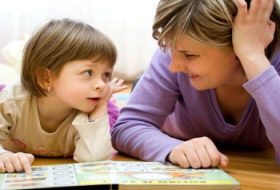10 Tips to Communicate Better with Your Child
 Good communication skills are the basis of any successful relationship,
whether between a husband and wife or parents and their children. Many parents
face problems while communicating with their children. Knowledge of certain
techniques can greatly improve their communication skills and I hope the
following tips I put together will help parents communicate better with their children. Good communication skills are the basis of any successful relationship,
whether between a husband and wife or parents and their children. Many parents
face problems while communicating with their children. Knowledge of certain
techniques can greatly improve their communication skills and I hope the
following tips I put together will help parents communicate better with their children.
1) Talking + Listening = Communication
The most common mistake that parents
make, is that they talk but never listen. While communicating, the flow of ideas
and thoughts should necessarily be two directional or it turns into a lecture.
The child must know that when you finish talking, he/she will get a chance to
speak. Try listening actively. Make encouraging gestures and sounds - nod your
head, say yes, all right, thats fine, etc.
Avoid: You listen to me.
Try: I want you to listen to me and then you can speak and Ill listen.
2) Don't Begin With an Accusation
If you start the conversation with an
accusation, the child will end it with a brief refusal. If you ask: Why did you
break the wall clock? The most likely response will be, I didn't.
A better way to approach the situation would be to ask, How did the clock
break? This will get the conversation going and you will receive a detailed
account of the events leading to the breaking of the clock. You can also utilize
this opportunity to teach the child to be more responsible in future.
Avoid: I don't believe you.
Try: Promise not to lie and I'll believe you.
3) Avoid Flowery Language
 Reserve your eloquence for boardroom meetings,
farewell parties and the like. While communicating with children, it is better
to keep things straight and simple. It is especially important when dealing with
a relatively young child because more often than not, the child will either miss
the point or misinterpret it. In case of older children, use of flowery language
can injure their pride and give them an inferiority complex. Reserve your eloquence for boardroom meetings,
farewell parties and the like. While communicating with children, it is better
to keep things straight and simple. It is especially important when dealing with
a relatively young child because more often than not, the child will either miss
the point or misinterpret it. In case of older children, use of flowery language
can injure their pride and give them an inferiority complex.
Avoid: You are an idiot of the highest order.
Try: You need to apply yourself more.
Avoid: Your room is worse than a pigsty.
Try: Your room needs urgent cleaning.
4) Words Are Like Bullets
There is no denying the power of the spoken word;
they are more potent than bullets. You can use them to attack or protect your
childs personality. If children feel they are being attacked they may:
- Clam up
- Start arguing
- Throw counter accusations
All the three situations interrupt the flow of communication, and may
alienate the child. As a rule, communication will deteriorate if you use
intimidating language. Parents who try to brow beat their child all the time may
succeed initially, but gradually the child will start paying back in the same
currency.

While dealing with children a mild attitude and milder vocabulary
usually produces the desired result.
Avoid: Come here immediately.
Try: Let's get together in five minutes.
Avoid: I want you home by six.
Try: Please be home between six and six-thirty.
5) Prevent Misinterpretation
 Remember, children are not expert face readers,
so they cannot decipher the real reason behind your grim expression. In most
instances they will misread the look on a parent's face and presume that they
have done something wrong. Remember, children are not expert face readers,
so they cannot decipher the real reason behind your grim expression. In most
instances they will misread the look on a parent's face and presume that they
have done something wrong.
If parents are upset or angry because of a problem at the workplace or due to
something else, they must let their children know about it. There is no need to
get into the details, just tell the child: "Something/someone has made me very
angry, but it has nothing to do with you. Let me have tea and rest for a while,
and then Ill feel much better".
This small, thoughtful piece of communication can not only relieve the
child's anxiety, it can make him/her more favorably disposed towards you.
6) Written Notes Are a Good Idea
There are occasions when you need to
communicate your feelings in writing. Parents and children should use this
method more often, as written communication gives an opportunity to phrase one's
thoughts more coherently. Notes praising children for good behavior, helping in
housework or doing well in studies are great morale boasters. Parents can
pleasantly surprise their children by slipping a message in their pencil box or
notebook saying that they love them very much or that they are proud of them.
Notes can also be used to register a complaint without creating a scene. When
you expect a showdown or want to avoid an unnecessary argument, written notes
are the best way to show your displeasure.
7) Wordless
Communication
An important means of communicating with children
is through eye contact and change of facial expression. When you are socializing
or in a setting where it is not possible to give verbal commands, you can show
your approval or disapproval by an encouraging or stern look. The success of
this form of communication depends on prior conditioning of the child. In spite
of your best efforts, sometimes the child may avoid eye contact with you so that
he/she can act according to his/her wishes. Don't get upset, children after all
are children.
8) Demonstrative Communication
 All human beings are born with a need to be
loved and never outgrow it. When it comes to communicating feelings of love and
care, many parents are found wanting. Many of us got our first real proof of
parental love when we fell sick. This indirectly means that illness, injury and
other adverse situations are a prerequisite for receiving love and care. Parents
must take care that children do not get such a distorted picture of the
parent-child relationship. The line: If you love somebody, show it, may sound
cliche, but it nevertheless holds true for many parents. So try to demonstrate
your love, show your care and express your feelings. All human beings are born with a need to be
loved and never outgrow it. When it comes to communicating feelings of love and
care, many parents are found wanting. Many of us got our first real proof of
parental love when we fell sick. This indirectly means that illness, injury and
other adverse situations are a prerequisite for receiving love and care. Parents
must take care that children do not get such a distorted picture of the
parent-child relationship. The line: If you love somebody, show it, may sound
cliche, but it nevertheless holds true for many parents. So try to demonstrate
your love, show your care and express your feelings.
Demonstrative communication can be verbal or physical. Some verbal
statements you can use are:
- I am really proud to have a son/daughter like
you.
- If I scold you, it doesn't mean that I don't love
you.
- I am lucky to have such a
conscientious/dependable/meticulous child like you.
Don't assume your child knows that you feel this way, communicate with
him/her in your own words.
Demonstration of feelings is also very important for the development of a
warm and loving parent-child relationship. Never miss an opportunity to hug,
kiss or cuddle your child. If you don't give love today, your child will not
learn to receive it tomorrow - neither from you nor from anyone else. It has
been observed that such children are non-demonstrative themselves and may have
unproductive relationships later on in life. Children who have plenty of
emotional and physical contact with their parents find it easier to give and
receive love.
 9) Supportive Communication 9) Supportive Communication
It is important to keep a healthy repertoire of
words in your vocabulary to express your emotions and to sustain communication
with your children. Children may face problems while communicating because they
are unable to label their feelings. When children fail to find the appropriate
words or communicate their feelings verbally, they are likely to become
frustrated. Frustration may cause behavioral problems and destructive
tendencies. Sometimes in their haste they may choose the wrong words and offend
their parents, thus leading to an argument.
Parents must help their children to correctly label a feeling or emotion.
Here are some examples which can be used to assist the child:
- I get the feeling from your behavior that you are
trying to say ____________
- While you sound angry, it is actually your
frustration over ____________
- I guess you want to communicate that
____________
10)
Anticipatory Communication
A good parent can anticipate the child's mood and reaction to a situation. If
you are observant enough, you can see some nonverbal reaction: a dull look, a
deadpan expression, brimming eyes or intense denial. If you are quick to observe
and act on these expressions, you will have instant access to the child's
emotional turmoil. The child will also have an easier time communicating with
you because he/she can sense your involvement and concern. Parents who are good
at anticipatory communication have a very good chance of identifying and dealing
with the childs problems.
I hope these tips help some of you parents out there!
Parenting
Silent Bully: What Every Parent and Child Should Know
How to Protect Your Children Against Online Dangers
The Most Common Problems Teenagers Face Today
Tips on How to Manage Your Hyperactive Child
How to Make Your Child Into a Leader
Parenting Children with Learning Disabilities
10 Tips to Communicate Better with Your Child
How to Encourage Confidence in Your Child |